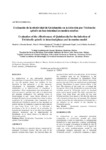
Please use this identifier to cite or link to this item:
http://ricaxcan.uaz.edu.mx/jspui/handle/20.500.11845/835Full metadata record
| DC Field | Value | Language |
|---|---|---|
| dc.contributor | 120273 | es_ES |
| dc.contributor.other | https://orcid.org/0000-0003-1324-4488 | - |
| dc.coverage.spatial | Global | es_ES |
| dc.creator | Dorado Bernal, Beatriz | - |
| dc.creator | Chávez Guajardo, Elsa | - |
| dc.creator | Maldonado Tapia, Claudia | - |
| dc.creator | Muñoz Escobedo, José Jesús | - |
| dc.creator | Moreno García, María Alejandra | - |
| dc.date.accessioned | 2019-03-22T20:51:56Z | - |
| dc.date.available | 2019-03-22T20:51:56Z | - |
| dc.date.issued | 2011-06 | - |
| dc.identifier | info:eu-repo/semantics/publishedVersion | es_ES |
| dc.identifier.issn | 1813-5363 | es_ES |
| dc.identifier.uri | http://localhost/xmlui/handle/20.500.11845/835 | - |
| dc.identifier.uri | https://doi.org/10.48779/4963-dy12 | - |
| dc.description | The trichinellosis is a parasitic disease transmitted by nematode Trichinella spiralis. The life cicle of the parasitic includes three stages: the intestinal phase, the parenteral phase and the muscular phase. At the moment the treatment used for the trichinellosis is the administration of albendazol or mebendazol. These medecines have demonstrated to be effective against the parasite, but only if they are administered per prolonged periods. Nevertheless it causes adverse effects in the host. The objective of this work was to evaluate the therapeutic effect of the Quinfamida as treatment for the infection caused by Trichinella spiralis in intestinal phase and in murine model. The study comprised four groups (four Long Evans rats each), the rats were infected and they were dosed at 24h after the infection with a duration of three days of treatment. The obtained results showed that the administration of Quinfamida is not effective to the control of the infection by Trichinella spiralis. | es_ES |
| dc.description.abstract | La trichinellosis es una enfermedad parasitaria transmitida por el nematodo Trichinella spiralis. El ciclo de vida del parásito abarca tres estadíos: la fase intestinal, la fase parenteral y la fase muscular. Actualmente el tratamiento utilizado para la trichinellosis es la administración de albendazol y mebendazol. Estos medicamentos han demostrado ser efectivos contra el parásito, pero sólo si se administran por periodos prolongados. Sin embargo existe el inconveniente de que causa efectos adversos en el huésped. El objetivo de este trabajo fue evaluar el efecto terapéutico de la Quinfamida como tratamiento de la infección por Trichinella spiralis en fase intestinal, en modelo murino. Se formaron 4 grupos de cuatro ratas de la cepa Long Evans cada uno, se infectaron y dosificaron a las 24 hs después de la infección. La duración del tratamiento fue de tres días. Los resultados obtenidos mostraron que la administración de Quinfamida no es eficaz frente a la infección por Trichinella spiralis. | es_ES |
| dc.language.iso | spa | es_ES |
| dc.publisher | Colegio de Bioquímica y Farmacia de Bolivia | es_ES |
| dc.relation.uri | generalPublic | es_ES |
| dc.rights | Atribución-NoComercial-CompartirIgual 3.0 Estados Unidos de América | * |
| dc.rights.uri | http://creativecommons.org/licenses/by-nc-sa/3.0/us/ | * |
| dc.source | BIOFARBO, Vol. 19, No. 1, junio 2011, pp. 28 - 33 | es_ES |
| dc.subject.classification | BIOLOGIA Y QUIMICA [2] | es_ES |
| dc.subject.other | Quinfamida | es_ES |
| dc.subject.other | Tratamiento | es_ES |
| dc.subject.other | Trichinella spiralis | es_ES |
| dc.subject.other | Fase intestinal | es_ES |
| dc.subject.other | intestinal phase | es_ES |
| dc.title | Evaluación de la efectividad de Quinfamida en la infección | es_ES |
| dc.type | info:eu-repo/semantics/article | es_ES |
| Appears in Collections: | *Documentos Académicos*-- UA Ciencias Biológicas | |
Files in This Item:
| File | Description | Size | Format | |
|---|---|---|---|---|
| Quinfamida..pdf | 389,9 kB | Adobe PDF |  View/Open |
This item is licensed under a Creative Commons License
